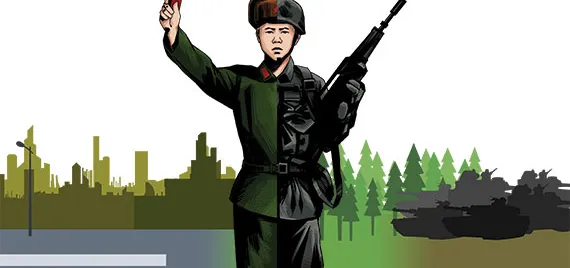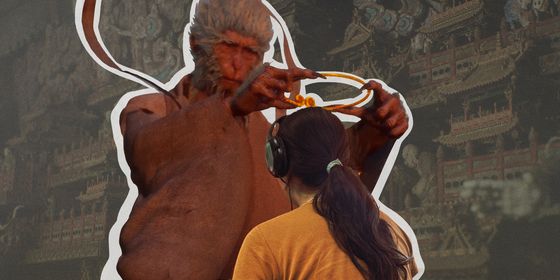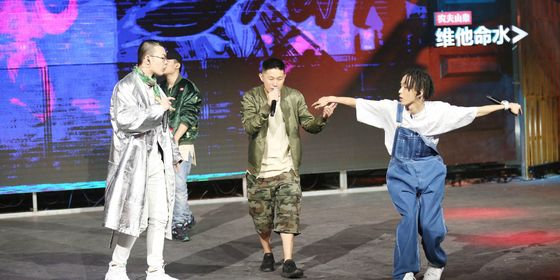The army looks to more modern methods for their recruitment drive
Tanks roll over American soldiers in a Korean trench declaring, “Judgment Day for American Imperialists”; soldier icon Lei Feng is backlit with a holy yellow light befitting a saint; and People’s Liberation Army (PLA) soldiers stand resolutely against a backdrop of airplanes and cornucopias of food. Propaganda posters in Soviet-style vibrancy and socialist-style courage used to be good enough for recruiting new soldiers. Today, you have the pop song “Little Apple” by the Chopstick Brothers.
In July of 2014, China’s Ministry of Defense promoted a video of soldiers dancing in loosely choreographed steps to a naff, upbeat pop song, intercut with computer generated graphics of fighter jets flipping in the sky, military hardware rolling down the streets, and brave soldiers marching. The video went viral and is still lauded as a recruitment success. Whereas the focus used to be on what one can do for one’s country, now the focus is on the individual.
“In the past, we always talked about patriotism and the greatness of this career. But now, we emphasize self-fulfillment, self-realization, and self-worth. To cater to young people, we focus on individuals more than before,” says a political instructor who wishes to be referred to as Chen Jiaxu. Holding the rank of Captain, the military academy graduate went on to say, “Personally, I think that, nowadays, when people choose their career, they care more about the money than before. People are more materialistic, so being a soldier no longer seems an ideal choice for them.”
Using the promise of adventure and self-fulfillment on young minds is hardly a new selling point when talking about military recruitment, but the PLA has had to move quickly in evolving its recruitment angles. Glorious Mission (《光荣使命》) gained a few headlines when it hit shelves a couple of years ago: a first person shooter in which players take on the Japanese for disputed islands—with an extra update that allows for a direct battle for the Diaoyu Islands. Developed by the PLA’s Nanjing Military Area Command and developer Giant Interactive Group, it is a long way from the Lei Feng posters of the past.
Glorious Mission’s fictional invasions fill a niche that has largely been the forte of Western-based developers, such as Call of Duty, Command and Conquer, and Counter-Strike. Fei Yongjun, president of Giant Interactive, commented on the release of the Diaoyu Islands expansion in China Daily, saying that, “The online version will target teenage gamers and military buffs and help bolster national defense education among teenagers.”
China’s foray in the modern world of military recruitment is off to a slow start, but many think it’s working. “You can see we use more popular elements, like the popular song ‘Little Apple’. We want to show the young people a different image. But we are just starting out this way,” Chen says. “Some soldiers around me have said that they were attracted by these commercials, or even some of the TV shows themed around military life. They thought it was cool.”
There are, of course, other modern methods: PLA commercials on ads before Youku videos, anti-Japanese dramas, and the ubiquitous yearly recruiting drive of the nation’s willing. But, this is the age of the internet, and it is an area where China’s military recruiters are having trouble.
The PLA—which is famously not a fan of the internet, having called it an “ideological battlefield” with “revolutionary potential” in the past—is still working on how to maximize social networking to get modern, educated soldiers. The Ministry of Defense began its Weibo and WeChat accounts in May of 2015; the idea however has been more to increase transparency rather than to recruit new troops.
However, regardless of how many anti-Japanese dramas are pasted on the television, regardless of how many video games promote the life of military service, regardless even of patriotism, the life of a soldier is famously grim. On this front, the military has responded with lighter requirements.
Last year’s recruitment drive—which starts annually in late July and early August—saw a relaxation of the soldier’s life and a few changes to entice willing recruits, including the addition of musical instruments and jukeboxes.
The authorities lowered the height requirements from 162 centimeters to 160 for male recruits, with a similar drop to 158 for women. Also, with China’s expanding waistlines, exceptions are being made for the portly PLA soldiers.
The greatest impact on recruiting numbers has traditionally come from the loosening and tightening of policy. “I think policy is the most influential aspect. About five years ago, the [job] placement policy changed…Soldiers [who aren’t promoted] won’t get a job unless they’ve served for more than 12 years. Fewer people applied after the policy took effect. But, the number of recruits is regulated by the authorities,” Chen says.
“The PLA Wants You” is a story from the issue, “Military”. To continue reading, become a subscriber and receive the full magazine. Alternatively, you can purchase the digital version from the iTunes Store.











